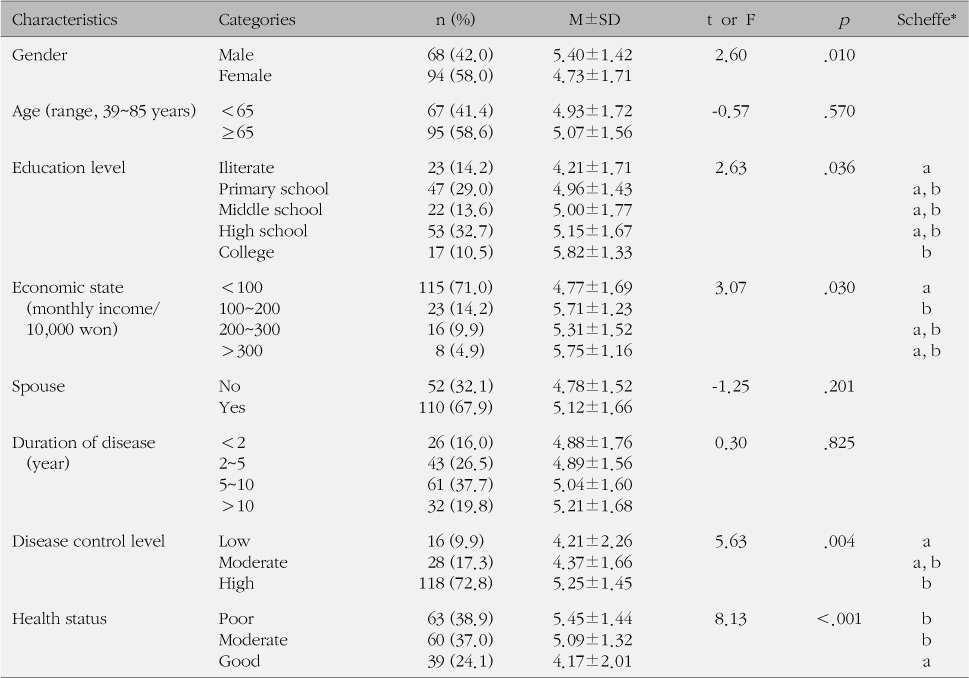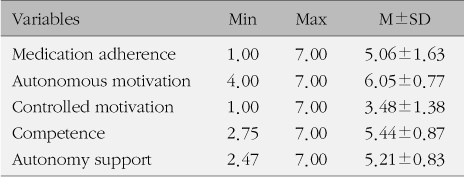Articles
- Page Path
- HOME > J Korean Acad Community Health Nurs > Volume 21(1); 2010 > Article
-
Original Article
- Factors Influencing Medication Adherence in Hypertensive Patients
- Yeong-Mi Seo
-
Journal of Korean Academy of Community Health Nursing 2014;21(1):82-91.
DOI: https://doi.org/10.12799/jkachn.2010.21.1.82
Published online: April 4, 2014
Full-time Lecturer, Department of Nursing, Jinju Health College, Korea.
• Received: January 18, 2010 • Revised: March 5, 2010 • Accepted: March 10, 2010
© 2010 Korean Academy of Community Health Nursing
This is an Open Access article distributed under the terms of the Creative Commons Attribution Non-Commercial License (http://creativecommons.org/licenses/by-nc/3.0/) which permits unrestricted non-commercial use, distribution, and reproduction in any medium, provided the original work is properly cited.
- 708 Views
- 5 Download
- 9 Crossref
Abstract
-
Purpose
- The purpose of this study was to identify factors that influence medication adherence in patients with hypertension.
-
Methods
- One hundred sixty two patients with hypertension who visited the outpatient clinics of health centers in J City participated in the study. Data were collected through a questionnaire survey done from January 9 to February 25, 2008. To analyze the sample survey data, descriptive statistics, t-test, ANOVA, Scheffe's test, and multiple regression analysis were performed with SPSS/WIN 12.0.
-
Results
- Significant factors that affect medication adherence in patients with hypertension were autonomous motivation, competence, health status, and sex. These variables explained 24% of medication adherence (F=12.48, p<.001).
-
Conclusion
- The results indicate that in order to improve the medication adherence of patients with hypertension it is important to develop nursing programs that focus on autonomous motivation and competence and to give consideration to differences in health status and sex. Also further studies are needed to confirm autonomous motivation related to health behavior in patients with hypertension.
Table 1Adherence with Therapeutic Regimen of Medication according to General Characteristics (N=162)


- 1. Bandura A. Social foundations of thought and action: A social cognitive theory. Englewood Cliffs. NJ: Prence-Hall; 1986.
- 2. Bramley TJ, Gerbino PP, Nightengale BS, Frech-Tamas F. Relationship of blood pressure control to adherence with antihypertensive monotheraphy in 13 managed care organization. J Manag Care Pharm. 2006;12:239–245.
- 3. Chang KO. The Relationship among health habits, perceived health status and knowledge related to hypertension and medication compliances of hypertensive elderly. Busan: Busan Catolic University; 2003. Unpublished mater's thesis.
- 4. Deci EL, Ryan RM. Intrinsic motivation and self-determination in human behavior. New York: Plenum; 1985.
- 5. Fawcett J. Compliance: Definition and key issue. J Clin Psychiatry. 1995;56:Suppl 1. 4–8. discussion 9-10
- 6. Ha YC, Chun HJ, Hwang HG, Kim BS, Kim JR. The prevalence, awareness, treatment, and control of hypertension, and related factors' in rural korea. Korean J Prev Med. 2000;33(4):513–520.
- 7. Jeon HO. Influencing factors on self-care in the elderly with essential hypertension. J Korean Acad Community Health Nurs. 2008;19(1):66–75.
- 8. Kennedy S, Goggin K, Nollen N. Adherence to HIV medications: Utility of the theory of self-determination. Cognit Ther Res. 2004;28:611–628. Article
- 9. Kim KE. A study on health behaviors and medication compliances of hypertensive patients in rural area. J Korean Community Nurs. 2002;13(1):49–56.
- 10. Kim KW. Social welfare research methodology. Seoul: MJ Media; 2008.
- 11. Korea Centers for Disease Control and Prevention. 2007 Korea national health statistics: The forth korea national health and nutrition examination survey (Issue Brief No. 11702). Seoul: Korea Centers for Disease Control and Prevention; 2008. 12.
- 12. Lee MJ. The life-style and the self-care of the patients with hypertension and diabetes in Jinhae city. Busan: Inje University; 2006. Unpublished master's thesis.
- 13. Ministry for Health, Welfare and Family Affair. Key chronic disease management guideline. 2009. Seoul: Ministry for Health, Welfare and Family Affair; 2009.
- 14. Nicholas LMW. Determinants of adherence in women managing chronic health conditions. New York, USA: University of Rochester; 2004. Unpublished doctoral dissertation.
- 15. Pellitier LG, Dion SC, Slovenic-D'Angelo M, Reid R. Why do you regulate what you eat? Relationship between forms of regulation, eating behaviors, sustained dietary behavior change, and psychological adjustment. Motiv Emot. 2004;28:245–277.
- 16. Ryan RM, Connell JP. Perceived locus of causality and internalization: Examining reasons for acting in two domains. J Pers Soc Psychol. 1989;57:749–761. Article
- 17. Sheldon KM, Williams GC, Joiner T. Selfdetermination theory in the clinic: Motivating physical and mental health. New Haven, CT: Yale University Press; 2003.
- 18. So AY, Kim YM, Kim EY, Kim CY, Kim CH, Kim HG, et al. Effects of communuty-based case management program for clients with hypertension. J Korean Acad Nurs. 2008;38(6):822–830. Article
- 19. Suh SL, Seo YM. Exercise adherence and ifluential factors in adults. J Korean Data Anal Soc. 2009;11(1):199–212.
- 20. Sung SK. Medication adherence and the treatmentrelated factors in the patients initiating antihypertensive therapy. Daejeon: Chungnam National University; 2008. Unpublished doctoral dissertation.
- 21. Yoo WS, Kim YK, Kim JH, Choi SK, Jeon YB. A study on the compliance of patients with essential hypertension IV. Inje Med J. 1991;12(1):67–71.
- 22. World Health Organization. Adherence to long-term therapies. Evidence for action 2003;01;Retrieved November 8, 2009. from http://www.who.int/chp/knowledge/publications/adherence_full_report.pdf
- 23. Williams GC. Improving patients' health through supporting the autonomy of patients and providers. In: Deci EL, Ryan RM, editors. Handbook of self-determination research. Rochester, NY: University Of Rochester Press; 2002. p. 233–254.
- 24. Williams GC, Freedman ZR, Deci EL. Supporting autonomy to motivate glucose control in patients with diabetes. Diabetes Care. 1998;1:1644–1651.
- 25. Williams GC, Grow VM, Freedman ZR, Ryan RM, Deci EL. Motivational predictors of weight loss and weight-loss maintenance. J Pers Soc Psychol. 1996;70:115–126. Article
- 26. Williams GC, McGregor HA, King D, Nelson CC, Glasgow RE. Variation in perceived competence, glycemic control, and patient satisfaction: Relationship to autonomy support from physicians. Patient Educ Couns. 2005;57:39–45. Article
- 27. Williams GC, Rodin GC, Ryan RM, Grolnick WS, Deci EL. Autonomous regulation and adherence to long-term medical regimens in adult outpatients. Health Psychol. 1998;17:269–276.
- 28. Williams GC, Patrick H, Niemiec CP, Williams LK, Devine G, Lafata JE, et al. Reducing the health risks of diabetes: How self-determination theory may help improve medication adherence and quality of life. Diabetes Educ. 2009;35:484–492. ArticlePDF
- 29. Zoffmann V, Lauritzen T. Guided self-determination improves life skills with Type1 diabetes and A1C in randomized controlled trial. Patient Educ Couns. 2006;64:78–86. Article
Figure & Data
References
Citations
Citations to this article as recorded by 

- An Education-Counseling Program for Young Prehypertensive Adults
Eunhee Jo, Soon-jung Hwang, Eun- jin Jeong, Minsun Kim
Clinical Nursing Research.2023; 32(2): 349. CrossRef - Drug Attitude and Medication Adherence of Patients with Early Psychosis in South Korea: Mediating Effect of Medication Adherence Self-Efficacy
Yoon-A Choi, Young-Ran Kweon
Patient Preference and Adherence.2023; Volume 17: 1247. CrossRef - Testing a Middle-Range Theory of Self-Care of Chronic Illness: A Validation for Korean Adult Patients with Severe Hypertension
Eunha Gil, Heeyoung Oh
Journal of Korean Academy of Nursing.2018; 48(5): 521. CrossRef - The effects of medication adherence and health literacy on health‐related quality of life in older people with hypertension
Nam Hee Park, Mi Sook Song, So Young Shin, Ji‐hye Jeong, Hyo Young Lee
International Journal of Older People Nursing.2018;[Epub] CrossRef - The Effects of Adherence and Hypertension Control on Complication among Newly Diagnosed Hypertension Patients
Jin-Ok Han, Jun Yim, Jeong-Soo Im, Hee Young Lee, Jong Heon Park, Dae-kyu Oh
Health Policy and Management.2015; 25(2): 90. CrossRef - The Relationship between Psychological Needs and Health Promoting Behavior in Community-dwelling Older Women
Journal of East-West Nursing Research.2015; 21(2): 126. CrossRef - A Study on Relationships between Health Literacy, Disease-related Knowledge and Compliance to Medical Recommendations in Patients with Hypertension
Myung Soon Kwon, Ghee-Young Noh, Ji Hye Jang
Journal of Korean Public Health Nursing.2013; 27(1): 190. CrossRef - Influencing Factors on Medication Adherence in Colorectal Cancer Patients Receiving Oral Chemotherapy
Jeong Hye Kim
Asian Oncology Nursing.2012; 12(3): 213. CrossRef - Impact of Health Literacy on Disease-related Knowledge and Adherence to Self-care in Patients with Hypertension
Youn-Jung Son, Eun-Kyeung Song
Journal of Korean Academy of Fundamentals of Nursing.2012; 19(1): 6. CrossRef

 KACHN
KACHN



 PubReader
PubReader Cite
Cite

